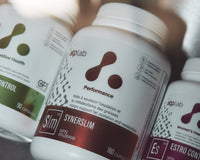Sucralose: Are you a consumer?

Sometimes, when I ask this question, people say "no", because they do not sweeten their coffee with Splenda. It is worth repeating that sucralose is mainly used in the manufacture of processed food, even in sport nutrition products. Supplement manufacturers, committed to providing quality, do not add sucralose to their products and here’s why:
Sucralose (1,6— dichloro-1, 6 — dideoxy -β- D-fructofuranosyl -4 — chloro-4— deoxy-α-D-galactopyranoside) has approximately 360-385 times the sweetening power of sucrose – also known as table sugar. This represents an incidental discovery by scientists that were working on the development of a new insecticide. Interestingly though, there is a covalent bond with chlorine. This means that there is no dissociation between chlorine molecules and sugar molecules in the human body, unlike, for example, table salt.
When sucralose is exposed to high temperatures, it generates chloropropanols a potentially toxic class of compounds which cause oxidative stress in the body – it is thought to be damaging the DNA.
Because it is not considered as sugar, it is often perceived as "it won’t have a larger negative effect on insulin resistance", but don’t be fooled. Sucralose accelerates the intestinal transit of sugar via taste receptors in the intestines. It is also capable of changing the body’s insulin response, and therefore, may affect insulin resistance with taste receptors expressed in pancreatic cells. Thus, it stimulates the GLP-1 release (glucagon-like-peptide-1) that is involved in first-phase insulin secretion. When there is no sugar at all, we have a metabolic issue. Furthermore, a study among obese women demonstrated that sucralose increases blood sugar levels.
That is already a lot of data to assimilate, but on the metabolic standpoint, we have not seen anything yet. In fact, sucralose is responsible for intestinal flora imbalance; meaning, that it is reduced by at least 50%. This is a serious outcome if we consider that the intestinal flora affects our metabolism and neurotransmitter production. It produces some vitamins, such as vitamins of B group and K group – the bacteria produce substances – medium-chain fatty acids that nourish intestinal cells. In other words, sucralose has a negative impact on good bacteria (lactobacilli, bifidobacterium, bacteroides, etc.) without harming the bad bacteria, for example, the enterobacter.
In 2016, a study examining rats showed that sucralose causes a thyroid disorder and reduces thyroperoxydase (TPO) activity as well as T4 and T3 levels. Although, more data are needed. If confirmed, it should not really be a surprise, don’t you think? The outcome: a slow metabolism.
The adverse events develop slowly at very small doses. In 2012, a study examining mice that was carried out over a period of 12 weeks, revealed a weight gain in some mice; mice-related outcomes showed 10.9%, it is higher than normal (a dose of 1.1mg/kg was given to mice, which is the same dosage for kids).
To sum up, sucralose does not have any health benefits. Taken in very small doses, it is likely to cause significant adverse events (temporary or permanent), such as intestinal flora imbalance and negative impact on GLP-1, insulin and blood sugar levels. On top of that, it is potentially toxic. I suggest that you avoid it completely. Check if sucralose is included in your nutritional supplements. ATP Lab products are 100% certified without sucralose or other chemical sweeteners!
Sources: https://www.ncbi.nlm.nih.gov/pubmed/25231862 https://www.ncbi.nlm.nih.gov/pmc/articles/PMC4449731/ https://www.ncbi.nlm.nih.gov/pmc/articles/PMC4494042/ https://www.ncbi.nlm.nih.gov/pmc/articles/PMC3856475/ https://www.ncbi.nlm.nih.gov/pmc/articles/PMC3856475/#R330 https://www.ncbi.nlm.nih.gov/pmc/articles/PMC3856475/#R244 https://www.ncbi.nlm.nih.gov/pmc/articles/PMC3856475/#R253 https://www.ncbi.nlm.nih.gov/pmc/articles/PMC3856475/#R190 https://link.springer.com/article/10.1007%2Fs00394-016-1367-x https://www.ncbi.nlm.nih.gov/pmc/articles/PMC3856475/
Sucralose (1,6— dichloro-1, 6 — dideoxy -β- D-fructofuranosyl -4 — chloro-4— deoxy-α-D-galactopyranoside) has approximately 360-385 times the sweetening power of sucrose – also known as table sugar. This represents an incidental discovery by scientists that were working on the development of a new insecticide. Interestingly though, there is a covalent bond with chlorine. This means that there is no dissociation between chlorine molecules and sugar molecules in the human body, unlike, for example, table salt.
When sucralose is exposed to high temperatures, it generates chloropropanols a potentially toxic class of compounds which cause oxidative stress in the body – it is thought to be damaging the DNA.
Because it is not considered as sugar, it is often perceived as "it won’t have a larger negative effect on insulin resistance", but don’t be fooled. Sucralose accelerates the intestinal transit of sugar via taste receptors in the intestines. It is also capable of changing the body’s insulin response, and therefore, may affect insulin resistance with taste receptors expressed in pancreatic cells. Thus, it stimulates the GLP-1 release (glucagon-like-peptide-1) that is involved in first-phase insulin secretion. When there is no sugar at all, we have a metabolic issue. Furthermore, a study among obese women demonstrated that sucralose increases blood sugar levels.
That is already a lot of data to assimilate, but on the metabolic standpoint, we have not seen anything yet. In fact, sucralose is responsible for intestinal flora imbalance; meaning, that it is reduced by at least 50%. This is a serious outcome if we consider that the intestinal flora affects our metabolism and neurotransmitter production. It produces some vitamins, such as vitamins of B group and K group – the bacteria produce substances – medium-chain fatty acids that nourish intestinal cells. In other words, sucralose has a negative impact on good bacteria (lactobacilli, bifidobacterium, bacteroides, etc.) without harming the bad bacteria, for example, the enterobacter.
In 2016, a study examining rats showed that sucralose causes a thyroid disorder and reduces thyroperoxydase (TPO) activity as well as T4 and T3 levels. Although, more data are needed. If confirmed, it should not really be a surprise, don’t you think? The outcome: a slow metabolism.
The adverse events develop slowly at very small doses. In 2012, a study examining mice that was carried out over a period of 12 weeks, revealed a weight gain in some mice; mice-related outcomes showed 10.9%, it is higher than normal (a dose of 1.1mg/kg was given to mice, which is the same dosage for kids).
To sum up, sucralose does not have any health benefits. Taken in very small doses, it is likely to cause significant adverse events (temporary or permanent), such as intestinal flora imbalance and negative impact on GLP-1, insulin and blood sugar levels. On top of that, it is potentially toxic. I suggest that you avoid it completely. Check if sucralose is included in your nutritional supplements. ATP Lab products are 100% certified without sucralose or other chemical sweeteners!
Sources: https://www.ncbi.nlm.nih.gov/pubmed/25231862 https://www.ncbi.nlm.nih.gov/pmc/articles/PMC4449731/ https://www.ncbi.nlm.nih.gov/pmc/articles/PMC4494042/ https://www.ncbi.nlm.nih.gov/pmc/articles/PMC3856475/ https://www.ncbi.nlm.nih.gov/pmc/articles/PMC3856475/#R330 https://www.ncbi.nlm.nih.gov/pmc/articles/PMC3856475/#R244 https://www.ncbi.nlm.nih.gov/pmc/articles/PMC3856475/#R253 https://www.ncbi.nlm.nih.gov/pmc/articles/PMC3856475/#R190 https://link.springer.com/article/10.1007%2Fs00394-016-1367-x https://www.ncbi.nlm.nih.gov/pmc/articles/PMC3856475/






